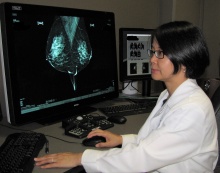Wang Arranges Agreement with AI Company BunkerHill
Xiaoquin (Jennifer) Wang, MD, from the Division of Women’s imaging has arranged a research agreement with an artificial intelligence company, Bunkerhill Medical. BunkerHill is a Y Combinator-backed startup out of Stanford University’s Artificial Intelligence in Medicine and Imaging (AIMI) center. The founders, Nishith Khandwala and David Eng, organized one of the first ever multi-institutional prospective clinical trial of an AI model (NCT03530098) and are now hoping to enable other researchers to clinically validate and deploy their AI models using the tools BunkerHill provides. The company is advised by Dr. Curt Langlotz, Dr. Safwan Halabi, Dr. Matt Lungren, Dr. David Larson, and Dr. Ross Filice.
Dr. Wang believes it is important to be involved in AI work. Just like PACS system, AI will transform our field. It is important for us to be a part of AI development. We need to embrace it so we know the tool very well. Many scientists have developed Deep Learning models for analyzing medical images. However, the full development of a deep learning model requires large numbers of images first to tune the model and second to test it to ensure its validity. Additional testing of its application in a clinical setting is necessary to ensure clinicians can use it confidently. Bunkerhill helps with this stage of validation. In Dr. Wang’s case, she and her collaborator Nathan Jacobs, PhD, in the department of Computer Science developed a novel algorithm to identify tumors in stacks of 3D mammograms. They developed their algorithm using data from our own Women’s Imaging center but they need additional data, particularly from outside UKHC, to validate their algorithm. Obtaining data from outside the center where the training data arose helps to avoid training bias in the AI algorithm. BunkerHill will facilitate the testing of the algorithm on outside data. The agreement with Bunkerhill also allows us to validate AI algorithms derived by other investigators on our own clinical data and do so without payment. This way we do not have to trust statements made by other groups / companies about how well their algorithms would work on our own data. Lastly, it is possible to contribute our own training data to a consortium and UK can receive license fees.
Commenting on their process, Bunkerhill scientists say:
“Before starting the trial, we let the model run behind-the-scenes at every institution and track its performance in comparison to radiologists. If necessary, we invite institutions to contribute their data to further train the model. The clinical trial begins after the model is deemed safe for a prospective study. Once validated, the model, now with a known clinical return on investment, is made available to the R&D partners for free. Should the researcher who developed the AI model choose to commercialize it on our platform, we will file for FDA approval, market it to our non-R&D partners, and share the revenue with the researcher.”
With BunkerHill, R&D partners can benefit from a collaborative network of hospitals:
- Researchers get to train their own AI models on data from multiple institutions and rigorously evaluate their clinical efficacy in a prospective, multi-institutional setting resulting in a peer-review publication; all for free.
- Radiologists can participate in validation studies of AI models built by their peers around the country, publish along with researchers and then use the models in practice for free.
- R&D partners can opt into
- (1) commercializing their AI research or distributing it for free
- (2) getting a revenue share for contributing data to training AI models.
The BunkerHill platform and all of its services are free of cost for all R&D partners.
Dr. Wang has worked with BunkerHill for approximately 18 mos and she, working with Jennifer Isaacs, have recently secured a master research agreement. Other investigators at UK could connect with BunkerHill to use their connections with other medical centers and to use BunkerHill’s tools to test the investigator’s AI algorithms. With the master study agreement as well as an IRB between UK and BunkerHill no further IRB protocols or legal agreements are necessary.
